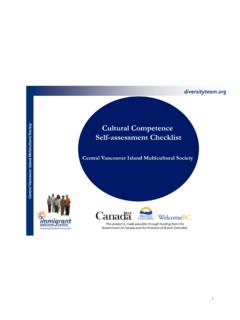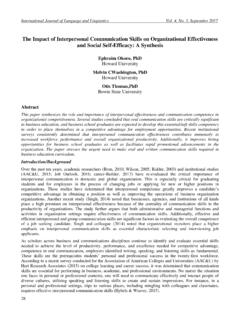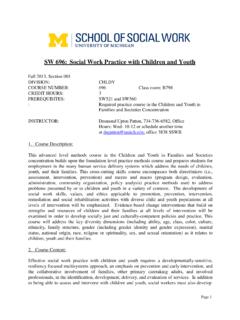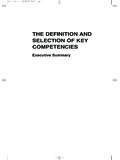Transcription of Standards of Practice for Culturally Competent Nursing ...
1 12-30-10. Expert Panel on Global Nursing & Health Standards of Practice for Culturally Competent Nursing Care Executive Summary A task force of the Expert Panel for Global Nursing and Health of the American Academy of Nursing , along with members of the Transcultural Nursing Society, has developed a set of Standards for cultural competence in Nursing Practice . The aim of this project was to define Standards that can be universally applied by nurses around the world in the areas of clinical Practice , research, education, and administration, especially by nurses involved in direct patient care. The document includes a Preface and 12 Standards : Standard 1. Social Justice Standard 2.
2 Critical Reflection Standard 3. Knowledge of Cultures Standard 4. Culturally Competent Practice Standard 5. cultural competence in HealthCare Systems and Organizations Standard 6. Patient Advocacy and Empowerment Standard 7. Multicultural Workforce Standard 8. Education and Training in Culturally Competent Care Standard 9. Cross cultural Communication Standard 10. Cross cultural Leadership Standard 11. Policy Development Standard 12. Evidence-Based Practice and Research For each standard, a definition, supporting rationale, and numerous suggestions for implementation are provided. A glossary of terms is appended. All Standards are based on the concepts of social justice and human rights, as defined by the United Nations and the International Council of Nurses.
3 These concepts are manifested at a systems or governmental level by political, economic, and social policies that exhibit impartiality and objectivity. All task force members have experience working with peoples from a variety of cultures throughout the world. In developing this document, the task force reviewed more than 50 documents on cultural competence published by Nursing and health care organizations worldwide. In addition, an on-line survey solicited comments from nurses in many countries. Responses from nurses representing a variety of settings and educational backgrounds were incorporated into the final document. Every attempt was made to develop Standards that can be used globally.
4 Page 1 of 35. 12-30-10. Expert Panel on Global Nursing & Health Standards of Practice for Culturally Competent Nursing Care PREFACE. The purpose of this document is to initiate a discussion of a set of universally applicable Standards of Practice for Culturally Competent care that nurses around the globe may use to guide clinical Practice , research, education, and administration. The recipient of the Nursing care described in these Standards is assumed to be an individual, a family, a community, or a population. These Standards are based on a framework of social justice(1), that is, the belief that every individual and group is entitled to fair and equal rights and participation in social, educational, economic, and, specifically in this context, healthcare opportunities.
5 Through the application of the principles of social justice and the provision of Culturally Competent care, inequalities in health outcomes may be reduced. The worldwide shortage of nurses and the global migration of both nurses and populations have heightened the need to educate nurses to deliver Culturally Competent care for an increasingly diverse patient population, regardless of geographic location.(2)(3) This need served as the primary impetus for this work. cultural Standards exist within political, economic, and social systems. Many health organizations throughout the world have defined care for their specific populations from the perspective of these systems.
6 The variation among Standards and the context within which Standards are practiced precludes a single set that fits all cultures. In preparing these Standards , nearly 50 relevant documents from Nursing organizations around the world were examined, as well as related materials from other healthcare professions, governmental, non-governmental (NGO), and health and human service organizations. Examples included, but were not limited to the following: the United Nations' Declaration of Human Rights,(4) the International Council of Nurses (ICN)'s Nurses and Human Rights,(5) the Nursing Council of New Zealand's Code of Conduct for Nurses,(6) the National Association of Social Workers' Standards for cultural competence in Social Work Practice ,(7) the World Health Organization's Declaration of Alma Alta,(8) the American Nurses Association (ANA)'s Code of Ethics,(9), The ICN Code of Ethics for Nurses, (10).
7 And the American Association of the Colleges of Nursing (AACN) Toolkits (11.). These 12 Standards can serve as a guide and resource for nurses in Practice , administration, education and research by emphasizing cultural competence as a Page 2 of 35. 12-30-10. Expert Panel on Global Nursing & Health priority of care for the populations they serve. The authors acknowledge that there may not be one single set of Standards that reflects all of the values of the global Nursing community, but they hope this work embodies a best practices approach that will enhance Culturally Competent Nursing care and health care around the globe. The authors recognize that there are variations in the interpretations of terms related to cultural competence .
8 Therefore a glossary is included at the end of this document. STANDARD 1: SOCIAL JUSTICE. Professional nurses shall promote social justice for all. The applied principles of social justice guide decisions of nurses related to the patient, family, community, and other health care professionals. Nurses will develop leadership skills to advocate for socially just policies. Social justice evolves from values of impartiality and objectivity at a systems or governmental level and is founded on principles of fairness, equity, respect for self and human dignity, and tolerance.(12, 13, 14) Practicing social justice is acting in accordance with fair treatment regardless of economic status, race, ethnicity, age, citizenship, disability, or sexual orientation.
9 (13, pg 29). Social justice and human rights issues are interwoven throughout the principles stated above. By focusing on social justice as a standard of cultural competence , we are consistent with the perspective addressed by the International Council of Nurses: We speak as advocates for all those we serve, and for all the underserved, insisting that social justice, prevention, care, and cure be the right of every human being. (15). Ethical principles, which may differ among cultures, are derived from an individual's beliefs as to the correctness of an action.(16) In contrast, principles of social justice are based on a broader systems view that expands the nurse's sphere of influence to populations and health care systems.
10 For example, Giddings' model of social consciousness notes power imbalances within health care systems regarding who received care.(17) Reimer-Kirkham, Van Hofwegen, and Harwood urged social transformation through transformative learning.(18). One of the outcomes of a liberal arts education at the baccalaureate level is the development of leadership skills. These skills are founded on knowledge derived from the humanities and social sciences as well as from natural sciences. Leadership skills Page 3 of 35. 12-30-10. Expert Panel on Global Nursing & Health prepare nurses to advocate for social justice. For example, nurses are expected to develop a commitment to the health of vulnerable populations and the elimination of health disparities.







